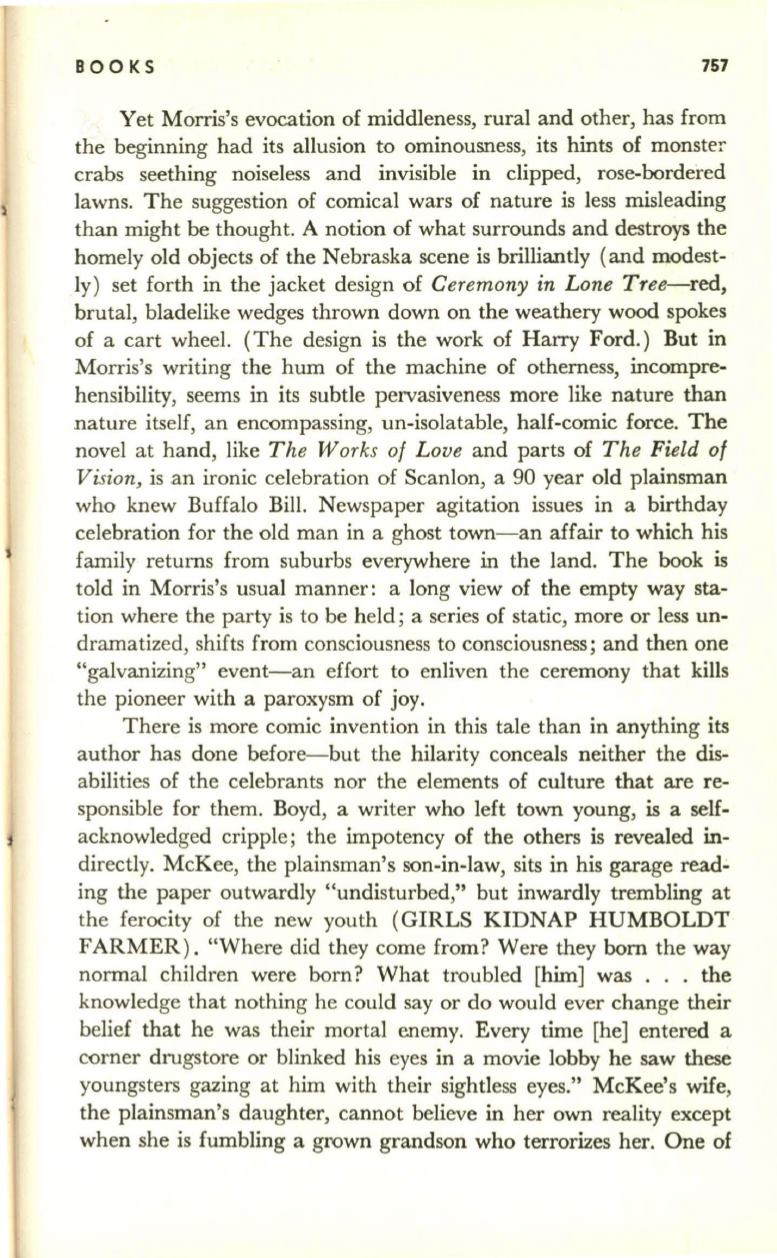
BOO KS
757
Yet Morris's evocation of middleness, rural and other, has from
the beginning had its allusion to ominousness, its hints of monster
crabs seething noiseless and invisible in clipped, rose-bordered
lawns. The suggestion of comical wars of nature is less misleading
than might be thought. A notion of what surrounds and destroys the
homely old objects of the Nebraska scene is brilliantly (and modest–
ly) set forth in the jacket design of
Ceremony in Lone Tree-red,
brutal, bladelike wedges thrown down on the weathery wood spokes
of a cart wheel. (The design is the work of Harry Ford.) But in
Morris's writing the hum of the machine of otherness, incompre–
hensibility, seems in its subtle pervasiveness more like nature than
nature itself, an encompassing, un-isolatable, half-comic force. The
novel at hand, like
The Works of Love
and parts of
The Field of
Vision,
is an ironic celebration of Scanlon, a 90 year old plainsman
who knew Buffalo Bill. Newspaper agitation issues in a birthday
celebration for the old man in a ghost town-an affair to which his
family returns from suburbs everywhere in the land. The book is
told in Morris's usual manner: a long view of the empty way sta–
tion where the party is to be held; a series of static, more or less un–
dramatized, shifts from consciousness to consciousness; and then one
"galvanizing" event-an effort to enliven the ceremony that kills
the pioneer with a paroxysm of joy.
There is more comic invention in this tale than in anything its
author has done before-but the hilarity conceals neither the dis–
abilities of the celebrants nor the elements of culture that are re–
sponsible for them. Boyd, a writer who left town young,
is
a self–
acknowledged cripple; the impotency of the others is revealed in–
directly. McKee, the plainsman's son-in-law, sits in his garage
read~
ing the paper outwardly "undisturbed," but inwardly trembling at
the ferocity of the new youth (GIRLS KIDNAP HUMBOLDT
FARMER). "Where did they come from? Were they born the way
normal children were born? What troubled
[him]
was . . . the
knowledge that nothing he could say or do would ever change their
belief that he was their mortal enemy. Every time [he] entered a
corner drugstore or blinked his eyes in a movie lobby he saw these
youngsters gazing at him with their sightless eyes." McKee's wife,
the plainsman's daughter, cannot believe in her own reality except
when she is fumbling a grown grandson who terrorizes her. One of


